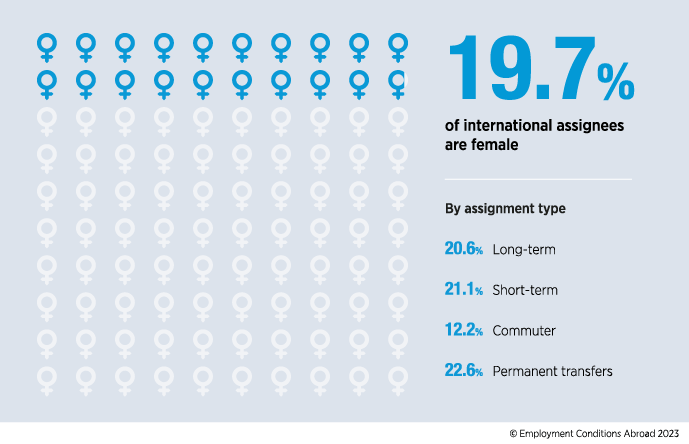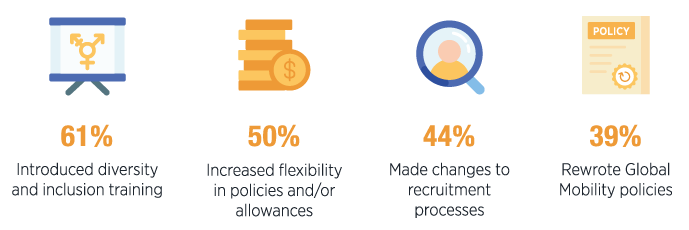Each year International Women's Day celebrates the social, economic, cultural and political achievements of women and marks a call to action for accelerating gender equality. Women are estimated to make up 40% of the workforce globally, so it follows that companies would seek to have women make up a similar proportion of their globally mobile workforces.
However, ECA’s Global Mobility Now Survey consistently finds the average proportion of women in the mobile workforce to be considerably smaller than this. The results are consistent for long- and short-term assignments, commuter assignments and permanent transfers.

This has important implications for the available talent pool. Our Managing Mobility Survey found that 45% of companies expect to increase the number of countries to which they assign talent in the next three years, while only 18% expect a decrease. As companies increasingly look to expand into more countries, they need to recruit individuals who are at ease working across global boundaries and understand international business operations. The more international experience you have, the more valuable you are for the insight and networks you can bring to grow the business globally. But when few women have these kinds of experiences, the talent pool from which companies look to draw is more limited and less diverse.
A lack of women going on international assignments also has ramifications for growing talent internally. Two-thirds of senior management teams agree or strongly agree that assignments are a means to providing potential future senior management with international experience, and over 60% of organisations expect an increase in developmental assignments in the near future, according to our Managing Mobility Survey. If women are less likely to undertake an international assignment, then not only might they personally miss out on a career development opportunity but their employers will be selecting their assignees from a smaller group of people and missing out on the greater breadth of perspectives and experiences that a diverse talent pool can bring. If international experience is a prerequisite of promotion to upper management, and significantly fewer women go on international assignments than men, the result is likely a glass ceiling effect.
What can companies do? Among the biggest barriers to women joining the mobile workforce are thought to be that women with children are less likely to undertake an assignment – most likely because women tend to do more childcare than men – and that their partners are less likely to want to come with them due to the risk it poses to their own career and income. However, these issues could equally apply to potential assignees regardless of gender identity, and companies must take care to avoid unconscious bias in their selection processes. So far 30% of organisations have already introduced policies to increase gender diversity in their mobility programme, and changes made by these organisations to increase diversity include:

Childcare costs are on the rise but only 22% of companies provide some form of assistance with this for children below school age in the host country, so flexible allowances – or introducing a dedicated childcare allowance to your policy – could have a real impact in making assignments more accessible. Other companies sometimes provide single parent allowances or spousal support, which could also help with childcare and dual career households respectively.
But do measures like these really make a difference to gender diversity in the mobile workforce, not to mention diversity and inclusion across other groups? Only a quarter of organisations overall think they are successful at attracting a diverse range of mobile employees, but two-thirds of organisations who say diversity is a high priority claim that they have been successful or very successful and only 2% believe they have been unsuccessful. This correlation between prioritising diversity and perceived success in achieving it seems to suggest that focusing on the issue pays off. Yet only 15% plan to implement policies to increase gender diversity in the future, while 55% of companies have not introduced policies and do not plan to do so (and the numbers without plans to promote other kinds of diversity are even higher), which suggests there is still significant untapped potential for progress.
There is, however, cause for optimism. Although progress is slow, successive ECA surveys have nearly always found an increase in the proportion of female assignees compared to previous years, and the latest statistics are a considerable improvement on those from our first Managing Mobility Survey in 1994 when just 7% of assignees were female. We saw progress slow down between 2020 and 2022 but this is not at all surprising given the huge numbers of assignments suspended during the era of Covid-19 restrictions. So despite this, we can expect (and hope) that progress will now resume and that the numbers of women will continue to trend upwards in the years to come.
FIND OUT MORE
Our Consultancy & Advisory team can prepare surveys and offer workshops to support engagement and help find solutions to address gaps in DE&I. Our consultants also work with clients to benchmark and review GM benefit packages, optimising them to promote greater inclusivity.
Our Global Mobility Now Survey captures the latest trends in global mobility, including how mobile workforces are changing to meet business demands, how companies are using automation and data analytics, and their approach to cost pressures, risk management and assignee experience.
ECA’s Managing Mobility Survey looks at how companies manage each stage of the international assignment lifecycle, from recruitment and selection through to repatriation, and how they overcome the challenges that arise at each stage.
The results of our policy surveys are available for purchase – and are FREE for participants. Do get in touch for more information.
Please contact us to speak to a member of our team directly.